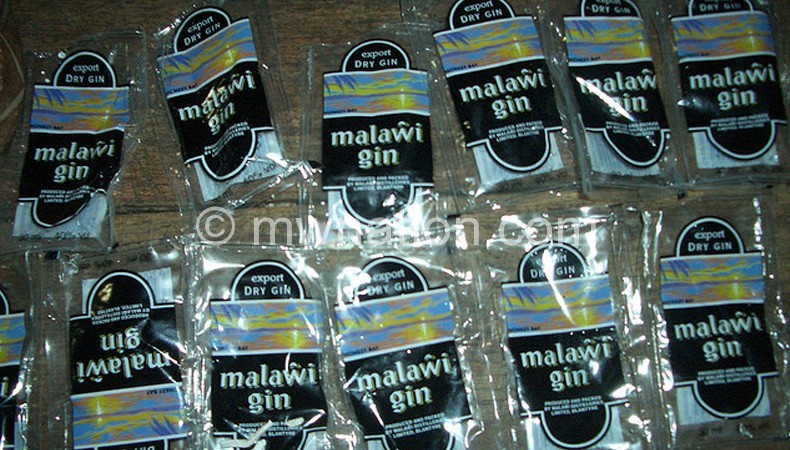Malawi Distilleries fears closure
Malawi Distilleries Limited, manufacturers of Premier Brandy, Malawi Gin, Powers No. 1 and Malawi Vodka, fear they can close shop following a recent High Court decision that has banned packaging of liquor in sachets in the country, according to the company’s lawyers.
Malawi Distilleries, which wanted a judicial review of the matter but had its application turned down on February 11 2015, told the court the company earns 91 percent annual profits from liquor packaged in sachets, hence it is going to close if the ban is imposed.
 But the High Court in Blantyre dismissed the application for the judicial review, which means that the Malawi Bureau of Standards (MBS), which won the case, is free to implement the ban.
But the High Court in Blantyre dismissed the application for the judicial review, which means that the Malawi Bureau of Standards (MBS), which won the case, is free to implement the ban.
Malawi Distilleries has since obtained a stay order, stopping the High Court’s decision pending an appeal in the Malawi Supreme Court.
MBS, apart from external pressure from lobbyists to ban the liquor available in sachets and easily accessed by, for example, students, minibus conductors and drivers, argued in court that packaging of spirits in plastic sachets is against the law.
The law, MBS210:1990, requires spirits to be packaged in clear glass bottles which do not affect the liquor’s quality.
But Malawi Distilleries, represented by lawyer Davis Njobvu, who has already filed a notice and grounds for appeal, argues that the MBS permitted Malawi Distilleries to package spirits in sachets.
He said beyond that, the bureau conducted quality audits and certified the company’s spirits in sachets as complying with standards.
Njobvu argued that to ban the sachets now is going “to be unreasonable when the practice has taken root” due to MBS’s conduct and representations which have caused Malawi Distilleries to invest heavily in the production of spirits, especially those in sachets, to the extent that their sales now account for 91 percent of the company’s annual profits.
The lawyer, in the grounds of appeal filed on Tuesday, feared the company’s business would not be viable without sale of spirits packaged in sachets.
He argues that Malawi Distilleries also has an impression that negotiations with MBS are ongoing and the ban is not going to be implemented.
But in his judgement earlier before a stay order on his own decision was granted, High Court Judge McLean Kamwambe said the illegality which was allowed for some years must be put to right.
Said Kamwambe: “The practice of packaging in sachets which was contrary to the legal provision MBS210:1990 cannot be perpetuated for ever under the pretext that the applicant’s (Malawi Distilleries) profits are 91 percent from such spirits [packaged in plastic] and that a lot of expense would be incurred to modify or replace the machinery in use.”
He said the unfortunate outcome should be weighed against the public interest, which he said in this case, overrides the company’s interest.
The judge observed the nation should not see a bad precedent being put in place because many laws are not implemented by government agents for one reason or another.
Said the judge: “Just because an individual was happy with the status quo of government agent’s laxity or lack of money, for instance, should not mean that government would be barred tomorrow or in future from implementing the law.
“This would be a big blow to the country’s effort to enforce the law and would certainly not be in the public interest.”
The judge said a blanket ban cannot be challenged since the reason for the ban is not the quantity of the packaging by some manufacturers, but that the spirit packaging in sachets is non-conformable to the standard which came into effect on January 1 1992.
Malawi Distilleries argued earlier in court that it pushed for minimum packaging of the spirits from 30 ml to 100 ml.
Kamwambe dismissed the application and ordered Malawi Distilleries to pay MBS costs for the proceedings.
In a September 2011 ruling, Kamwambe threw out an application for an injunction by the bureau when it wanted Malawi Distilleries and [other spirit manufacturers] to be restrained from packaging the spirits in plastic sachets.
The judge had argued then that the bureau is a non-profit making institution which is unlikely to compensate the companies’ losses which might have resulted from the ban.
Kamwambe also said MBS tolerated the manufacturers for a long time to package the spirits in sachets and he believed that negotiations were going on.
These are the same arguments lawyer for the Malawi Distilleries is using in his current appeal as he argues that the judge is contradicting his own 2011 decision.






Even if the company closes who cares? If people lose their jobs they will other jobs. We cannot let the youth be destroyed in the name of profits. The sachets were destroying our children. In fact, these sachets were targeting the youth. I am happy the government has banned them.
It is also a pity that government could not control how they were sold. How do you sell liquor anywhere? In South Africa selling liquor is very controlled. Bravo government. Don’t listen to their lame excuse.